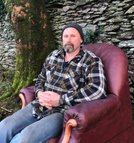Dealing With Death?
First published by Moon-Books.net, November 2013
In Ireland the month of November is called Samhain in the native tongue but it is also the name for Halloween. Today most people celebrate Halloween with ‘Trick or Treating’ and bonfires on 31st of October (5th of November in UK), not realising that these are modern forms of ancient religious celebrations associated with the coming of winter and the festival of the dead.
At this time people were aware of the literal death of the year – the end of the harvest and the trees and plants dying or becoming dormant. In Celtic belief the year (which was split into two halves) began as the darkness began, just as the day began as soon as the sun set. Elsewhere in Europe and indeed as far away as South America, this time was a celebration of the ancestors and an acknowledgement of the role of death in our lives.
Of course, until very recently, death was an every-day part of human life – before proper sanitation, vaccines and antibiotics the Western death rate was incredibly high and people were used to accepting the likelihood that many of their friends and family would die during their own lifetime. These days people are often completely shocked and unprepared for death. This is perhaps understandable in the case of those who die young, who we no-longer expect to receive an early death, but in the case of the elderly many still have tremendous trouble in dealing with the inevitable passing over of loved ones.
Personally I feel that this inability to handle an important part of our lives is directly due to the removal of the ritual and close proximity formerly associated with dying. Although far less common now, the wake, where the deceased is still kept in the house (in an open coffin) for up to three days still happens in Ireland. In less traditional Irish families and in other countries the deceased are often spirited away to a funeral parlour and not seen again until the burial/cremation. The wake ancient funereal custom forces a finality on those left behind and also offers a very direct and immediate opportunity for grieving.
During the period of the wake there is a great deal of eating, drinking (both tea and alcohol) and also lots of chat about the deceased that may include both crying and laughing in large amounts. In both Celtic Pagan and Christian belief it was considered that the dead person was hopefully moving on to a better place and hence the wake and post-burial gathering often centres around happy memories and celebration as much as it does mourning. Rather than sweeping it under the carpet or denying the gravity of the situation, the Irish tradition confronts the death head on; so by the time of the ‘removal’ and the actual funeral many of the family and friends are already well advanced in the process of saying goodbye to the deceased.
This appears to me to be a very healthy way of dealing with death, even if it does often involve excessive drinking. In fact, the drinking itself can be cathartic in that it loosens people up and enables expression of emotion that might otherwise be difficult for some. This form of funereal tradition is respectful and very much deep rooted in community, not least because of the long held beliefs in regard to ancestors.
In many places around the world this time of the year is a time to remember our ancestors – where we came from. This has been a strong tradition in Celtic countries until the very recent past, however respect for the ancestors is still equally important to other cultures today e.g. China, Japan and many other Asian countries. We may now live in a global village, with family ties across different countries and different cultures, but it’s still important to remember where we come from and that without our ancestors we would not be here. Like all things that live we will also die, and it will eventually be our time to join them and become ancestors ourselves.

